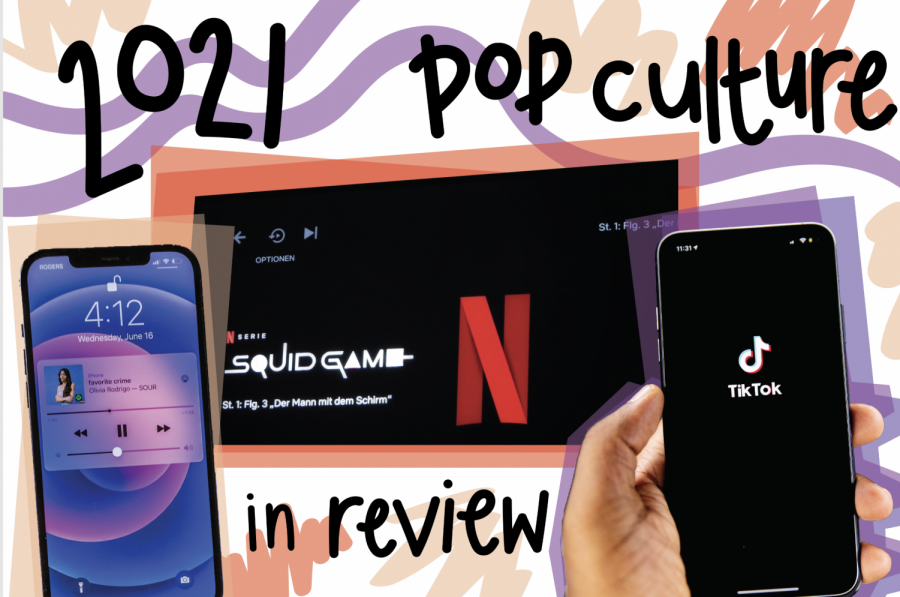If panic defined 2020, then ennui defined 2021.
During the first half of the year, the vaccine rollout had just begun and there was a pervasive idea that 2021 would be a rambunctious year of nightlife renaissance. Well, reality set in, variants arrived and excitement dissipated.
As a result, the biggest pop culture touchstones of the year reflect both the nation’s perpetually deepening divisions and how those divisions encourage audiences to devour pop culture comfort food: celebrity family drama, nostalgia, activities involving excessive screen time, etc. In a year Americans of every background desperately desired the “normal” and “the way things used to be,” here were ten of the biggest pop culture movements:
’00s Revival
As Y2K fashion returned, both Travis Barker and Megan Fox experienced Instagrammable relationship-based renaissances, Bennifer 2.0 graced tabloids, Lindsay Lohan landed a Netflix deal, Paris Hilton’s public image was reconsidered and hyper-pop hyperbolized the ’00s music tropes, nostalgia for the decade hit a fever pitch in 2021.
#FreeBritney
In 2021, the Free Britney movement snowballed into the biggest headline-grabber in entertainment news. The fans who led the movement often spoke of how they grew up with the star, allowing audiences an opportunity to unabashedly revisit the pop music of their early childhoods. Although Britney Spears’ conservatorship has finally ended, the reconsideration of her immeasurable talent and the ripple effects for fellow pop stars’ legacies (Janet Jackson, Justin Timberlake, etc.) will hold influence beyond the end of this year.
Astroworld Festival disaster
Travis Scott, a longtime perpetuator of chaos, now faces $2 billion in fines after nine people were crushed to death in the crowd at the poorly-planned festival he organized. The festival stood out in a year that generally brought an increased focus on the health of concert-goers. Astroworld only intensified the spotlight on every artist grappling with crowd management on top of COVID’s constant threat.
British royal family drama
Early this year, the family drama fired up when Meghan Markle and Prince Harry dropped bombshells in an Oprah interview that encouraged audiences to reconsider the long lasting interpersonal effects of the crown’s racist colonial history. Just weeks later, Prince Phillip died and the public began to think more about the inevitable monumentality of the Queen’s death. Not to mention the gluttony of other documentaries and re-imaginings of the family’s recent history, most notably “Spencer” and “The Crown”
Celebrities “coming out” as anti-vaxx
In May, many thought Americans would look back on summer 2021 as the “hot vax summer.” Instead, an anti-vax movement emerged, the delta variant took hold and chaotic public statements ensued. Whether you were more taken aback by Nicki Minaj’s cousin’s friend in Trinidad or Aaron Rodgers’ questionable use of the word “immunized,” it became clear in 2021 that anti-vax stances had overtaken offensive tweets as the quickest way to tarnish a reputation.
Insurrection Day on Twitter
The events of Jan. 6, 2021, obviously transcend pop culture, now ranking alongside 9/11 and Pearl Harbor as one of the most infamous dates in the country’s modern history. However, it was also the culmination of the most significant social media account ever: President Donald Trump’s Twitter. False statements about the day’s events proved to be Jack Dorsey’s last straw. Meanwhile, memes about the day’s events — unrelated to Trump — spread like wildfire: The confused-looking old lady, the Florida man who tried to run off with Nancy Pelosi’s lectern and the QAnon Shaman’s wild look. One would be hard pressed to find any singular day on social media that mattered more to politics than Jan. 6.
Kimye’s demise
Love ‘em or hate ‘em, the Kardashian Industrial Complex defined ‘10s pop culture. In the early days of 2021, a turning point emerged in the form of Kim Kardashian and Kanye West’s breakup. With “Keeping Up With the Kardashians” off the air and “Donda” critically flopping, the breakup symbolized how pop culture tides may have finally turned against the billionaire power-couple’s out-of-touch persona.
Olivia Rodrigo
With ascent so astronomical it drew quick comparisons to Billie Eilish’s 2019 and Lorde’s 2013, Olivia Rodrigo turned from a nondescript Disney star to the inarguable pop star du jour in spring 2021. As far as teen prodigies go, Rodrigo’s breakout year encapsulates not only her own success, but that of Taylor Swift. As T-Swift embarked on a marquee year of her own, the Taylor’s Versions provided an avenue for listeners to better track the true origin of Rodrigo.
Squid Game
This year’s runaway Netflix hit joined “Parasite” and BTS in a trifecta of South Korean media that boosted the country’s international status as a purveyor of taste. Like “Parasite,” the show examined the violent lengths common people will take to evade exponentially growing economic inequality, becoming the most successful show in Netflix’s history by several metrics.
TikTok established its staying power
In 2020, TikTok was a trend; in 2021, TikTok dictated the trends. Anyone who still describes the social media titan as an app for dancing teens has fallen woefully behind the cultural conversation. Cooking, fashion, music, comedy and breaking news experts now all depend on TikTok’s creators to move the discussion forward. PinkPantheress, The D’Amelio Show, Addison Rae’s movie debut, Emily Mariko’s salmon-and-rice dish, nearly every unofficial theory surrounding Gabby Petito’s disappearance and, yes, several dance crazes all grew out of the constantly changing landscape of the Internet’s new epicenter this year. Luddites can dismiss the site all they want, but the fact of the matter is that pop culture grows from there now and it will likely continue as such for years.













